#PHP variable syntax
Explore tagged Tumblr posts
Text
PHP Syntax Tutorial for Beginners | Basic PHP Syntax
Learn the basics of PHP syntax in this beginner-friendly guide. Understand PHP tags, variables, data types, echo, print, comments, and more with easy examples. Mastering PHP Syntax: A Beginner’s Guide PHP (Hypertext Preprocessor) is a widely-used open-source server-side scripting language that is especially suited for web development. Before diving deep into PHP development, it’s essential to…
#learn PHP syntax#PHP basic syntax#PHP code structure#PHP echo vs print#PHP examples#PHP for beginners#PHP syntax#PHP syntax rules#PHP syntax tutorial#PHP variable syntax
0 notes
Text

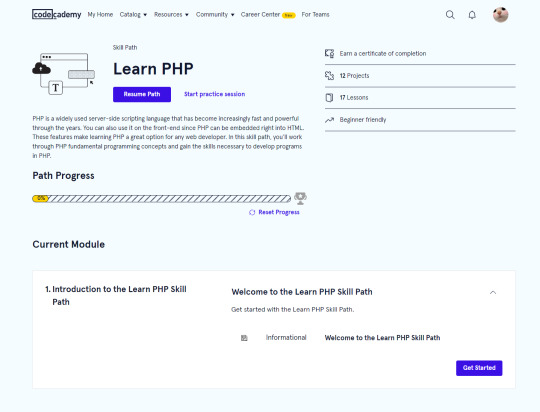
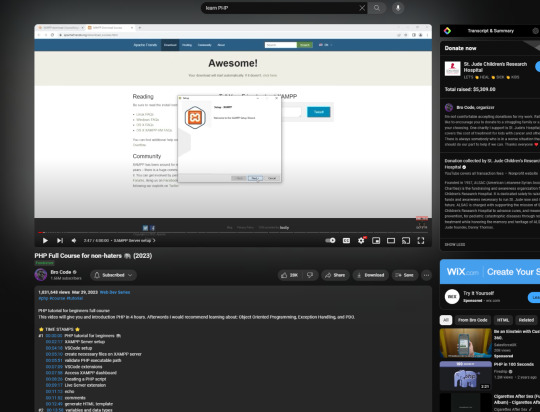
Saturday 2nd March 2024 - [ Week 1 Day 1 ]
First programming language in the list to tackle is PHP~!! I've heard of it before but never actually learnt how to program using it! I've heard you can build websites using PHP!
For resources I am using BroCode on YouTube and Codecademy's 'Learn PHP' course! I can start off with them and still look around for other small resources I can use!
Today I will be studying the fundamentals, of course:
Syntax
Variables
Constants
Comments
Data Types
Operators

💌 Day 1: What are you most looking forward in learning PHP?
Learning how people use PHP to make websites! Since I love Web Development, I'm excited to finally study and programming in PHP to make web-based projects in the future!

#5in5weeks#study challenge#programming#coding#studyblr#codeblr#studying#comp sci#progblr#tech#programmer#php#study#study hard#studyspiration#night study#stay productive
20 notes
·
View notes
Text
Computer Language
Computer languages, also known as programming languages, are formal languages used to communicate instructions to a computer. These instructions are written in a syntax that computers can understand and execute. There are numerous programming languages, each with its own syntax, semantics, and purpose. Here are some of the main types of programming languages:
1.Low-Level Languages:
Machine Language: This is the lowest level of programming language, consisting of binary code (0s and 1s) that directly corresponds to instructions executed by the computer's hardware. It is specific to the computer's architecture.
Assembly Language: Assembly language uses mnemonic codes to represent machine instructions. It is a human-readable form of machine language and closely tied to the computer's hardware architecture
2.High-Level Languages:
Procedural Languages: Procedural languages, such as C, Pascal, and BASIC, focus on defining sequences of steps or procedures to perform tasks. They use constructs like loops, conditionals, and subroutines.
Object-Oriented Languages: Object-oriented languages, like Java, C++, and Python, organize code around objects, which are instances of classes containing data and methods. They emphasize concepts like encapsulation, inheritance, and polymorphism.
Functional Languages: Functional languages, such as Haskell, Lisp, and Erlang, treat computation as the evaluation of mathematical functions. They emphasize immutable data and higher-order functions.
Scripting Languages: Scripting languages, like JavaScript, PHP, and Ruby, are designed for automating tasks, building web applications, and gluing together different software components. They typically have dynamic typing and are interpreted rather than compiled.
Domain-Specific Languages (DSLs): DSLs are specialized languages tailored to a specific domain or problem space. Examples include SQL for database querying, HTML/CSS for web development, and MATLAB for numerical computation.
3.Other Types:
Markup Languages: Markup languages, such as HTML, XML, and Markdown, are used to annotate text with formatting instructions. They are not programming languages in the traditional sense but are essential for structuring and presenting data.
Query Languages: Query languages, like SQL (Structured Query Language), are used to interact with databases by retrieving, manipulating, and managing data.
Constraint Programming Languages: Constraint programming languages, such as Prolog, focus on specifying constraints and relationships among variables to solve combinatorial optimization problems.
2 notes
·
View notes
Text
Certificate Course in PHP Full Stack Developer at Nextskill Technologies, Coimbatore

In today's rapidly evolving digital landscape, the demand for skilled web developers is at an all-time high. Among the various programming languages, PHP Full Stack has emerged as a powerful and widely-used scripting language for web development. If you are keen on exploring a career in this exciting field, look no further than the Certificate Course in PHP Full Stack Developer offered by Nextskill Technologies in Coimbatore. This comprehensive program is designed to equip you with the knowledge and practical skills necessary to excel in the world of web development. Let's dive into the details of this exceptional course.
Why Certificate Course in PHP Full Stack Developer?
Before delving into the specifics of the course, let's understand why PHP Full Stack Developer is a lucrative and sought-after skill in the tech industry.
Versatility: PHP Full Stack can be seamlessly integrated with various databases, frameworks, and content management systems, making it a versatile language for developing dynamic web applications.
High Demand: Many popular websites, including Facebook and WordPress, are built using PHP Frameworks. The language's prevalence ensures a steady demand for skilled PHP Full Stack developers.
Open Source Advantage: Being an open-source language, PHP Frameworks is constantly updated and enriched by a vibrant community of PHP developers, providing access to a vast array of libraries and tools.
Career Growth: PHP developers can explore various career paths, such as PHP full-stack developers,PHP backend developers, or even specialize in PHP-based frameworks like Laravel or CodeIgniter.
Nextskill Technologies: Empowering Your Journey
Located in the heart of Coimbatore, Nextskill Technologies has earned a reputation as a leading IT training institute with a focus on cutting-edge technologies. Their Certificate Course in PHP Full Stack Developer is a well-structured program that caters to both beginners and experienced professionals looking to enhance their web development skills.
Course Curriculum Certificate Course in PHP Full Stack Developer at Nextskill Technologies is designed to provide a comprehensive understanding of web development principles and practical hands-on experience. The well-organized curriculum includes:
Introduction to Web Development: An overview of web development, its technologies, and the role of PHP Full Stack Developer.
HTML, CSS, and JavaScript Fundamentals: Building a strong foundation in front-end development.
PHP Programming Basics: Learning PHP syntax, variables, operators, and control structures.
MySQL Database Integration: Understanding database design and integration with PHP frameworks.
Object-Oriented PHP: Mastering object-oriented PHP programming concepts and their implementation in PHP.
PHP Frameworks: Exploring popular PHP frameworks like Laravel for efficient development.
Front-end Frameworks: Implementing front-end frameworks like Bootstrap for responsive design.
Project Work: Applying the learned concepts to real-world projects under the guidance of experienced mentors.
Key Features of the Course
Experienced Faculty: The course is taught by industry experts with extensive experience in PHP Full Stack Developer, ensuring a quality learning experience.
Hands-on Training: Practical exercises and real-world projects provide students with valuable hands-on experience.
Placement Assistance: The institute offers placement support and guidance to help students kickstart their careers.
Certification: Upon successful completion of the course, participants receive a recognized certificate, adding value to their resumes.
Conclusion
The Certificate Course in PHP Full Stack Developer at Nextskill Technologies, Coimbatore, is an excellent opportunity for aspiring web developers to gain the skills and knowledge required to thrive in the competitive tech industry. With a well-structured curriculum, experienced faculty, and a supportive learning environment, this course serves as a stepping stone towards a successful career in PHP Full Stack Developer. Embrace this opportunity, and let Nextskill Technologies be your guide on this rewarding journey.
For More Details: https://nextskilltechnologies.com/
#PHP Full Stack Developer#PHP Developer#web development#PHP Programming#Front-end Development#Back-end Development#PHP Frameworks#html#css
2 notes
·
View notes
Text
PHP list() Function
The PHP list( ) function is used to assign values to a list of variables in one operation. This function was introduced in PHP 4.0.
Syntax
array list ( mixed $var1 [, mixed $... ] );
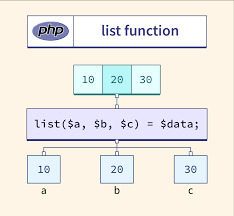
0 notes
Text
Complete PHP Tutorial: Learn PHP from Scratch in 7 Days
Are you looking to learn backend web development and build dynamic websites with real functionality? You’re in the right place. Welcome to the Complete PHP Tutorial: Learn PHP from Scratch in 7 Days — a practical, beginner-friendly guide designed to help you master the fundamentals of PHP in just one week.
PHP, or Hypertext Preprocessor, is one of the most widely used server-side scripting languages on the web. It powers everything from small blogs to large-scale websites like Facebook and WordPress. Learning PHP opens up the door to back-end development, content management systems, and full-stack programming. Whether you're a complete beginner or have some experience with HTML/CSS, this tutorial is structured to help you learn PHP step by step with real-world examples.
Why Learn PHP?
Before diving into the tutorial, let’s understand why PHP is still relevant and worth learning in 2025:
Beginner-friendly: Easy syntax and wide support.
Open-source: Free to use with strong community support.
Cross-platform: Runs on Windows, macOS, Linux, and integrates with most servers.
Database integration: Works seamlessly with MySQL and other databases.
In-demand: Still heavily used in CMS platforms like WordPress, Joomla, and Drupal.
If you want to build contact forms, login systems, e-commerce platforms, or data-driven applications, PHP is a great place to start.
Day-by-Day Breakdown: Learn PHP from Scratch in 7 Days
Day 1: Introduction to PHP & Setup
Start by setting up your environment:
Install XAMPP or MAMP to create a local server.
Create your first .php file.
Learn how to embed PHP inside HTML.
Example:
<?php echo "Hello, PHP!"; ?>
What you’ll learn:
How PHP works on the server
Running PHP in your browser
Basic syntax and echo statement
Day 2: Variables, Data Types & Constants
Dive into PHP variables and data types:
$name = "John"; $age = 25; $is_student = true;
Key concepts:
Variable declaration and naming
Data types: String, Integer, Float, Boolean, Array
Constants and predefined variables ($_SERVER, $_GET, $_POST)
Day 3: Operators, Conditions & Control Flow
Learn how to make decisions in PHP:
if ($age > 18) { echo "You are an adult."; } else { echo "You are underage."; }
Topics covered:
Arithmetic, comparison, and logical operators
If-else, switch-case
Nesting conditions and best practices
Day 4: Loops and Arrays
Understand loops to perform repetitive tasks:
$fruits = ["Apple", "Banana", "Cherry"]; foreach ($fruits as $fruit) { echo $fruit. "<br>"; }
Learn about:
for, while, do...while, and foreach loops
Arrays: indexed, associative, and multidimensional
Array functions (count(), array_push(), etc.)
Day 5: Functions & Form Handling
Start writing reusable code and learn how to process user input from forms:
function greet($name) { return "Hello, $name!"; }
Skills you gain:
Defining and calling functions
Passing parameters and returning values
Handling HTML form data with $_POST and $_GET
Form validation and basic security tips
Day 6: Working with Files & Sessions
Build applications that remember users and work with files:
session_start(); $_SESSION["username"] = "admin";
Topics included:
File handling (fopen, fwrite, fread, etc.)
Reading and writing text files
Sessions and cookies
Login system basics using session variables
Day 7: PHP & MySQL – Database Connectivity
On the final day, you’ll connect PHP to a database and build a mini CRUD app:
$conn = new mysqli("localhost", "root", "", "mydatabase");
Learn how to:
Connect PHP to a MySQL database
Create and execute SQL queries
Insert, read, update, and delete (CRUD operations)
Display database data in HTML tables
Bonus Tips for Mastering PHP
Practice by building mini-projects (login form, guest book, blog)
Read official documentation at php.net
Use tools like phpMyAdmin to manage databases visually
Try MVC frameworks like Laravel or CodeIgniter once you're confident with core PHP
What You’ll Be Able to Build After This PHP Tutorial
After following this 7-day PHP tutorial, you’ll be able to:
Create dynamic web pages
Handle form submissions
Work with databases
Manage sessions and users
Understand the logic behind content management systems (CMS)
This gives you the foundation to become a full-stack developer, or even specialize in backend development using PHP and MySQL.
Final Thoughts
Learning PHP doesn’t have to be difficult or time-consuming. With the Complete PHP Tutorial: Learn PHP from Scratch in 7 Days, you’re taking a focused, structured path toward web development success. You’ll learn all the core concepts through clear explanations and hands-on examples that prepare you for real-world projects.
Whether you’re a student, freelancer, or aspiring developer, PHP remains a powerful and valuable skill to add to your web development toolkit.
So open up your code editor, start typing your first <?php ... ?> block, and begin your journey to building dynamic, powerful web applications — one day at a time.

0 notes
Text
Mastering PHP for Career Growth: The Power of Online and In-Person Training
In today’s rapidly evolving digital world, web development is the backbone of most successful businesses. Among the many tools and programming languages used in this field, PHP (Hypertext Preprocessor) has stood the test of time as a powerful and flexible language. From dynamic websites to content management systems like WordPress, PHP powers a significant portion of the internet.
For aspiring developers and IT professionals, mastering PHP is no longer optional—it’s essential. Whether you're a student, a working professional, or someone seeking a career shift, the right training can transform your future. In this blog, we explore the importance of PHP training, compare different learning formats, and highlight where to get the best php online training and PHP Training in Chandigarh.
Why Learn PHP in 2025?
While newer languages such as Python and JavaScript often take the spotlight, PHP remains an indispensable language in the web development ecosystem. Here's why PHP continues to thrive in 2025:
Wide Adoption: Nearly 77% of websites still use PHP in some form.
WordPress & CMS Integration: Most major content management systems are built using PHP.
Server-Side Scripting: PHP is extremely efficient for building dynamic websites.
Easy to Learn: PHP is beginner-friendly, making it ideal for those new to programming.
Massive Community Support: With decades of community involvement, resources, forums, and updates are abundant.
Whether you're looking to become a full-stack developer or specialize in back-end development, PHP is a core skill that provides flexibility and demand in the job market.
Different Modes of PHP Learning: Which is Right for You?
The way we learn has evolved dramatically, especially post-2020. Today, PHP can be learned through various modes:
1. Traditional Classroom Training
In-person learning offers real-time interaction with trainers, hands-on experience, and instant feedback. This format works best for learners who prefer structured environments and direct mentoring.
2. Online Training
With php online training, students can access recorded lectures, attend live sessions, and learn at their own pace. This option is perfect for working professionals or those who live far from training institutes.
3. Hybrid Learning
Combining the flexibility of online learning with occasional in-person workshops, hybrid models are increasingly popular.
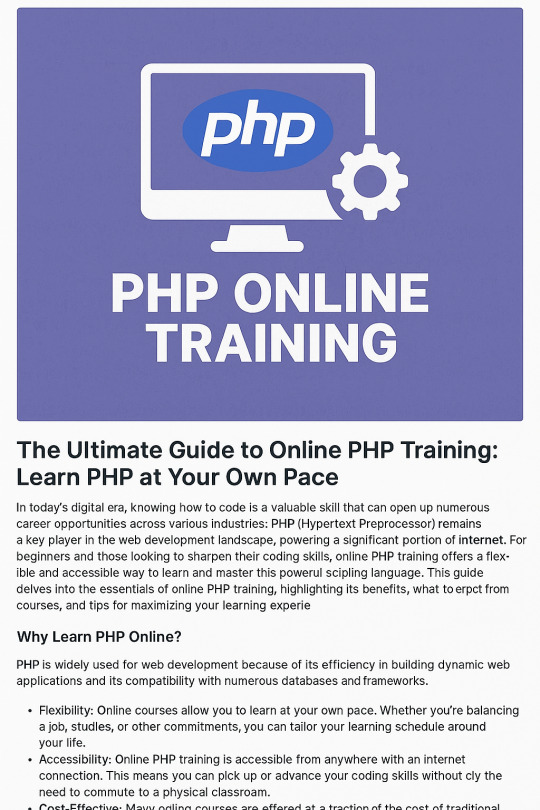
What Makes a Good PHP Course?
Before enrolling in any course, it’s important to know what to look for. A high-quality PHP training program should include:
Basics to Advanced Concepts: Starting from syntax, variables, loops, and functions to OOP (Object-Oriented Programming), MySQL integration, and frameworks like Laravel.
Real-time Projects: Practical experience matters. Working on live projects provides exposure to real-world scenarios.
Certification: Recognized certifications boost your resume and prove your expertise.
Placement Assistance: Job assistance programs add immense value to training programs.
Career Opportunities After PHP Training
PHP opens doors to a wide range of job opportunities, such as:
PHP Developer
Web Developer
Full-Stack Developer
CMS Developer
Freelance Web Programmer
Backend Developer
With companies of all sizes—from startups to MNCs—looking for skilled PHP developers, the scope of employment is vast and continuously growing.
Why Choose PHP Training from a Reputed Institute?
While self-learning is possible, enrolling in a structured program ensures comprehensive understanding and guidance. A reputed institute offers:
Expert Trainers: Industry professionals who bring real-world experience.
Updated Curriculum: Courses tailored to current industry trends and tools.
Hands-on Learning: Opportunities to build projects, work in teams, and understand client requirements.
Mock Interviews and Resume Building: Soft skills are just as important as technical ones.
The Best Option for Learners: Chandigarh as a Training Hub
Chandigarh has emerged as a prominent educational hub, especially for IT and web development training. It offers several advantages:
Affordable Cost of Living
Presence of Top Training Institutes
Proximity to Major Cities like Delhi, Mohali, and Panchkula
Thriving Tech Industry
One of the standout benefits of getting PHP Training in Chandigarh is the blend of professional training and practical exposure. Institutes in Chandigarh often maintain partnerships with local businesses, giving students the chance to work on real client projects.
Additionally, for those who are unable to attend in-person sessions, many of these reputed institutes also provide php online training to cater to a global audience.
CBitss – A Name You Can Trust
Among the many institutes in Chandigarh, CBitss stands out due to its:
Experienced Trainers
Project-Based Curriculum
Online and Offline Learning Options
Excellent Student Reviews
100% Placement Support
Whether you’re a complete beginner or someone with prior programming knowledge, CBitss provides customized learning paths that align with your goals.
Testimonials from Students
“CBitss’s PHP course helped me land a job within two months of completion. The faculty was supportive and explained each topic with clarity.” — Rohit Verma, PHP Developer
“The online classes were well-structured and interactive. I could ask questions, access recorded sessions, and get timely feedback.” — Simran Kaur, Freelance Developer
Such positive feedback reflects the institute’s commitment to quality education.
Tips for Succeeding in Your PHP Journey
Practice Daily: Coding is a skill developed with practice.
Build Projects: Start with basic websites, then move to CMS or e-commerce projects.
Explore Frameworks: Learn Laravel, CodeIgniter, or Symfony after mastering core PHP.
Stay Updated: Follow PHP blogs, attend webinars, and participate in developer forums.
Collaborate: Join GitHub projects or coding communities.
Final Thoughts
PHP continues to be a leading choice for web development, especially when backed by proper training and real-world experience. Whether you choose to go the in-person route or opt for php online training, what truly matters is your dedication and consistency.
For those in North India, PHP Training in Chandigarh offers an unbeatable combination of quality education, industry exposure, and career support. Choose the right path today and unlock a future filled with opportunities in web development.
0 notes
Text
PHP with Mysql Training & Live Project
PHP with MySQL Training is a practical web development course focused on building dynamic and interactive websites. It begins with the basics of PHP syntax, variables, loops, and functions, followed by MySQL database concepts like creating tables, writing queries, and performing CRUD operations. The course emphasizes real-time application development through a live project, such as a blog, content management system, or e-commerce website. Students learn how to integrate PHP with MySQL, handle user input securely, manage sessions, upload files, and create login systems. Frontend tools like HTML, CSS, Bootstrap, and basic JavaScript may also be covered. By the end of the training, learners gain the skills to develop full-stack web applications, making them job-ready for roles in web development or freelancing.
A major highlight of the course is the live project, where students develop a real-world application such as a blog, content management system (CMS), or e-commerce website. The project includes features like user login, admin panel, product or post management, and responsive design using HTML/CSS/Bootstrap.
By the end of the training, students will have hands-on experience building complete web applications and the confidence to pursue internships, freelance gigs, or junior developer roles.
📞 Phone Number: +91 9511803947
📧 Email Address: [email protected]

0 notes
Text
PHP Tutorial: Your First Guide to Web Development with PHP
Are you ready to start your journey into the world of web development? If you're searching for a dynamic and beginner-friendly way to build powerful websites, you’ve probably come across PHP. This PHP Programming Language Tutorial by Tpoint Tech is designed to be your first step into the world of backend development, giving you the knowledge you need to get started—even if you’ve never written a line of code before.
What is PHP?
PHP, which stands for "Hypertext Preprocessor," is a widely-used open-source scripting language primarily suited for web development. Unlike HTML and CSS, which control how things look on a website, PHP is all about functionality—handling forms, connecting to databases, generating dynamic page content, and more.
It is used by some of the biggest names on the web, including Facebook and WordPress. In fact, more than 75% of websites that use a server-side programming language rely on PHP. This makes Learning PHP a smart and practical choice for aspiring developers.
Why Learn PHP?
One of the greatest advantages of PHP is its simplicity. It's an accessible language for beginners, yet powerful enough for professionals. Whether you're building a simple contact form or a complex content management system, PHP provides the flexibility and tools needed to succeed.
Here are a few reasons why Learning PHP is a solid investment in your web development career:
Beginner-Friendly: PHP has a gentle learning curve, which means you can get up and running quickly.
Vast Community Support: Thanks to its longevity and popularity, there are countless tutorials, forums, and resources available.
Cross-Platform Compatibility: PHP runs on virtually every operating system including Windows, Linux, and macOS.
Database Integration: PHP works seamlessly with databases like MySQL, which is essential for creating data-driven websites.
Fast and Efficient: PHP scripts execute quickly and efficiently, making your websites faster and more responsive.
How PHP Fits Into Web Development
To fully understand PHP’s role, it helps to know how websites work. When you visit a webpage, your browser sends a request to a server. If the page is built with PHP, the server processes the PHP code and then sends the resulting output (usually HTML) back to your browser. This is what makes PHP a “server-side” language—it does its work behind the scenes.
When paired with front-end technologies like HTML, CSS, and JavaScript, PHP becomes part of a powerful toolkit for building modern, interactive websites.
What You’ll Learn in This PHP Programming Language Tutorial
At Tpoint Tech, we believe in making learning simple, structured, and enjoyable. Our PHP Programming Language Tutorial is crafted to guide you step-by-step through the essentials of PHP development, even if you’ve never programmed before.
Here's an overview of what our tutorial covers:
Understanding the Basics: Learn about variables, data types, and how PHP fits into your HTML pages.
Control Structures: Master how to use conditions and loops to control the logic of your programs.
Forms and User Input: Learn how PHP handles user interactions like form submissions.
Working with Files and Databases: Get introduced to reading, writing, and organizing data with PHP.
Building Functional Web Applications: Apply what you’ve learned to create dynamic and real-world applications.
Throughout the tutorial, Tpoint Tech ensures the concepts are explained in clear, plain language with real-life analogies to make technical details easy to grasp.
No Coding Required to Get Started
You might be surprised to know that Learning PHP doesn’t have to start with writing code right away. At Tpoint Tech, we encourage learners to first build a strong understanding of concepts, structure, and logic before jumping into the syntax. This helps you develop a clearer mental model of how web technologies work together and makes the learning process smoother when you do begin coding.
Even without coding, you can explore how PHP-driven websites operate, analyze how server responses change with different inputs, and understand the purpose of various PHP components.
Final Thoughts
Learning PHP opens up a world of possibilities for anyone interested in web development. From enhancing static web pages to building robust web applications, PHP remains a staple technology in the developer's toolkit. At Tpoint Tech, we are excited to be part of your journey and provide the guidance, support, and resources needed to turn you from a beginner into a confident PHP developer.
So whether you're aiming to become a freelance developer, improve your resume, or build your own online projects, starting with a well-structured PHP Programming Language Tutorial like the one offered by Tpoint Tech is a decision you won’t regret.

0 notes
Text
PHP Training in Chandigarh – A Complete Guide for Aspiring Web Developers
In the rapidly evolving landscape of web development, PHP remains a foundational technology powering millions of websites globally. From WordPress to Facebook (in its early years), PHP has proved to be a robust and versatile scripting language. Chandigarh, being a prominent educational and IT hub in Northern India, has become a go-to destination for students and professionals seeking high-quality PHP training. This article delves into everything you need to know about PHP training in Chandigarh, from its significance to career prospects and the best training institutes.
Why Learn PHP?
PHP (Hypertext Preprocessor) is a server-side scripting language primarily used for web development. It's open-source, easy to learn, and has extensive support from the developer community. Here are a few reasons why learning PHP is a smart choice:
Widely Used: Over 75% of websites that use server-side scripting languages still rely on PHP.
Open Source: No licensing fees make it cost-effective for individuals and startups.
Integration Friendly: PHP works seamlessly with databases like MySQL, PostgreSQL, and Oracle.
Flexible and Scalable: From simple landing pages to complex enterprise web applications, PHP scales well.
High Demand: Despite the emergence of new languages, PHP developers remain in high demand globally.
The Growing IT Scene in Chandigarh
Chandigarh has steadily emerged as a major center for IT education and development. The presence of IT parks, MNCs, and local startups has fueled demand for skilled developers. With a rising number of digital marketing agencies, software houses, and web development companies in Mohali, Panchkula, and Chandigarh, PHP training institutes have become a critical part of the local educational ecosystem.
Who Should Take PHP Training?
PHP training is suitable for:
Students pursuing B.Tech, BCA, MCA, or M.Sc. (IT)
Fresh graduates aiming to build a career in web development
Working professionals who want to upskill or shift to backend development
Entrepreneurs and freelancers looking to create and manage their own websites
No prior programming experience is required for beginners' courses, making PHP an accessible entry point into the tech industry.
PHP Training Curriculum – What You Will Learn
A comprehensive PHP training course typically includes both core and advanced topics. Here's a breakdown of a standard PHP training curriculum in Chandigarh:
1. Introduction to Web Development
Basics of HTML, CSS, JavaScript
Understanding client-server architecture
2. Core PHP
Syntax, variables, and data types
Control structures: loops, if/else, switch
Functions and arrays
Form handling
Sessions and cookies
3. Database Integration
Introduction to MySQL
CRUD operations using PHP and MySQL
Database connectivity and configuration
4. Advanced PHP
Object-Oriented Programming (OOP) in PHP
Error and exception handling
File handling and data encryption
PHP security best practices
5. Frameworks and CMS (Optional but Valuable)
Introduction to Laravel or CodeIgniter
Basics of WordPress development
MVC architecture
6. Live Projects and Internships
Real-time project development
Deployment on live servers
Version control (Git basics)
Key Features of PHP Training Institutes in Chandigarh
When choosing a training institute in Chandigarh for PHP, consider the following features:
Experienced Trainers: Trainers with industry experience can bridge the gap between theoretical knowledge and practical application.
Hands-on Training: Good institutes emphasize coding, not just theory.
Live Projects: Implementing real-world projects enhances understanding and employability.
Placement Assistance: Many institutes offer job support through resume building, mock interviews, and tie-ups with local companies.
Flexible Timings: Options for weekend or evening batches are a boon for working professionals and students.
Top Institutes Offering PHP Training in Chandigarh
Here are some of the reputed institutes offering PHP training in Chandigarh:
1. Webtech Learning
Located in Sector 34, Webtech Learning offers a well-rounded PHP training program with live projects and job assistance. They are known for their experienced faculty and industry connections.
2. Chandigarh Institute of Internet Marketing (CIIM)
CIIM offers specialized PHP and web development training with certification and job placement support. They focus heavily on project-based learning.
3. ThinkNEXT Technologies
Located in Mohali, ThinkNEXT is an ISO-certified training institute offering comprehensive PHP training with internships and certifications.
4. Morph Academy
Morph Academy offers PHP training with a focus on web design, development, and integration with other technologies like WordPress and Laravel.
5. Netmax Technologies
Another well-known institute offering hands-on PHP training with flexible course durations and career counseling services.
Duration and Fees
The duration of PHP training courses in Chandigarh typically ranges from 1 to 6 months, depending on the course depth and inclusion of frameworks or internships. Short-term crash courses may also be available for those looking to learn quickly.
Basic Course (1–2 months): ₹8,000 – ₹12,000
Advanced Course (3–6 months): ₹15,000 – ₹25,000
Some institutes offer EMI options and combo packages with other web technologies like JavaScript, React, or Node.js.
Career Opportunities After PHP Training
PHP opens up several career paths in web development. Here are some roles you can apply for after completing your training:
PHP Developer
Web Developer
Backend Developer
Full Stack Developer (with knowledge of frontend tools)
WordPress Developer
Software Engineer (Web Applications)
Popular companies in Chandigarh, Mohali, and Panchkula that frequently hire PHP developers include Net Solutions, IDS Infotech, SmartData Enterprises, and Webdew.
Freelancing and Entrepreneurship
PHP is not just for job seekers. Many developers work as freelancers on platforms like Upwork, Freelancer, and Fiverr. If you have an entrepreneurial mindset, you can build your own websites, e-commerce stores, or even SaaS platforms using PHP and open-source tools.
Certification and Resume Building
Upon completion of PHP training, most institutes provide a certificate that adds credibility to your resume. However, what matters most to employers is your portfolio – the projects you’ve built and the skills you demonstrate in interviews.
Make sure your resume includes:
Technical skills (PHP, MySQL, HTML, CSS, JavaScript, etc.)
Live project links (GitHub or hosted sites)
Internship experiences (if any)
Certifications
Conclusion
PHP training in Chandigarh is an excellent investment for anyone looking to enter the web development field. With the city's growing IT ecosystem and the availability of high-quality training institutes, you can gain both the knowledge and practical experience required to start a successful career. Whether you're a student, job seeker, or freelancer, learning PHP can open the doors to numerous opportunities in the digital world.
0 notes
Text
PHP Variables : Syntax, Types, Scope, and Best Practices
Learn all about PHP variables including syntax, data types, variable scope, and best practices. A beginner-friendly guide to mastering PHP variables with examples. PHP Variables – A Complete Guide for Beginners PHP (Hypertext Preprocessor) is a powerful server-side scripting language widely used for web development. One of the foundational concepts in PHP—and in any programming language—is…
#PHP array variable#PHP for beginners#PHP global variable#PHP local variable#PHP programming#PHP static variable#PHP string variable#PHP syntax#PHP tutorial#PHP variable example#PHP variable naming#PHP variable scope#PHP variable types#PHP variables
0 notes
Text
The Best PHP Course in Coimbatore to Boost Your Programming Skills
Introduction
PHP is a powerful and widely adopted server-side scripting language designed for building dynamic and interactive web applications. Many popular websites, including Facebook, WordPress, and Wikipedia, are built using PHP for their functionality and scalability. If you are passionate about web development, mastering PHP is a great step toward a successful programming career.
In today’s digital world, businesses require robust and scalable web applications. PHP allows developers to create feature-rich websites that interact with databases and provide seamless user experiences. Its open-source nature and large developer community make it a preferred choice for beginners and experienced programmers.
For those looking to gain expertise in PHP, Codei5 Academy offers the best PHP course in Coimbatore. The course is designed to provide students with in-depth knowledge of PHP programming, database management, and frameworks like Laravel. With hands-on training, real-world projects, and expert guidance, students can build strong programming skills and become job-ready.
Why Choose PHP for Web Development?
PHP has been a dominant force in web development for years. It is a preferred choice for developers due to its simplicity, versatility, and wide range of applications. Below are some of the major advantages of learning PHP:
Beginner-Friendly Language – PHP has a simple and intuitive syntax, making it easy for beginners to learn and use.
High Demand for PHP Developers – Many companies require skilled PHP developers to build and maintain web applications.
Cross-Platform Compatibility – PHP works on different operating systems like Windows, Linux, and macOS.
Seamless Database Integration – It integrates easily with databases like MySQL, PostgreSQL, and MongoDB.
Scalability – PHP is suitable for building both small websites and large enterprise-level applications.
Vibrant Developer Community – PHP benefits from a large and active community that continuously contributes to updates and enhancements.
What You Will Learn in the Best PHP Course in Coimbatore
At Codei5 Academy, students will receive structured training covering both fundamentals and advanced aspects of PHP development. The curriculum is designed to provide practical exposure, ensuring that learners can apply their knowledge in real-world scenarios.
Core Topics Covered in the PHP Course
PHP Fundamentals
Understanding PHP syntax and structure
Variables, data types, and operators
Loops, arrays, and function
Database Management with MySQL
Introduction to MySQL and database concepts
CRUD (Create, Read, Update, Delete) operations
Writing optimized SQL queries
Object-Oriented Programming (OOP) in PHP
Understanding classes and objects
Inheritance, polymorphism, and encapsulation
Writing reusable and efficient code
Building Dynamic Web Applications
Creating interactive web pages using PHP
Form handling and validation
Working with session management and cookies
PHP Frameworks
Introduction to Laravel and CodeIgniter
MVC architecture and its benefits
Building applications using PHP frameworks
Security Best Practices in PHP
Protecting applications from SQL injection and XSS attacks
Secure user authentication and data encryption
Implementing best practices for coding and security
API Development in PHP
Understanding RESTful APIs
Creating and consuming APIs using PHP
Integrating third-party APIs in applications
Features of the Best PHP Course at Codei5 Academy
Choosing the right training institute is crucial for gaining practical knowledge and hands-on experience. Codei5 Academy offers a well structured PHP course designed to prepare students for real-world web development challenges.
Key Features of the PHP Course
Industry-Focused Curriculum – Covers all essential topics required in the job market.
Hands-On Training – Real-time projects to enhance coding and problem-solving skills.
Expert-Led Classes – Learn from experienced PHP developers with practical knowledge.
Convenient Learning Modes – Offers both classroom and online training to suit different learning preferences.
Placement Assistance – Career guidance and job placement support for students.
Practical Project Implementation – Gain experience by working on real-world projects, helping you build a strong portfolio.
Why Codei5 Academy is the Best Choice for PHP Training?
When choosing a PHP training institute, it is essential to consider factors like curriculum, teaching methodology, and placement support. Codei5 Academy stands out as the best PHP course in Coimbatore due to its commitment to quality education and practical learning.
Reasons to Choose Codei5 Academy for PHP Training
Recognized as the best PHP course in Coimbatore for hands-on learning.
Industry-relevant training with real-world projects to improve coding skills.
100% job assistance and career guidance for students.
Access to the latest PHP tools and technologies for modern web development.
Expert mentors with years of experience in PHP development.
A supportive learning environment that encourages problem-solving and creativity.
Conclusion
PHP remains one of the most valuable skills for aspiring web developers. Learning PHP opens up numerous career opportunities, allowing developers to build powerful, secure, and scalable applications.
By enrolling in the best PHP course in Coimbatore at Codei5 Academy, students gain in-depth knowledge, hands-on experience, and job-ready skills. Whether you are a beginner or an experienced programmer, this course provides the right foundation to advance your career in web development.
Take the next step in your programming journey and build a successful career in PHP development today!
#course#training#internship#education#php course#php development#php programming#php#php development services#developers
0 notes
Text
```markdown
IDE for SEO Scripts: Enhancing Your Coding Efficiency
In the world of Search Engine Optimization (SEO), scripts play a crucial role in automating tasks, analyzing data, and improving website performance. However, writing these scripts can be a daunting task, especially when it comes to debugging and maintaining them. This is where an Integrated Development Environment (IDE) comes into play. An IDE is a software application that provides comprehensive facilities to computer programmers for software development. In this article, we will explore how an IDE specifically designed for SEO scripts can enhance your coding efficiency.
Why Use an IDE for SEO Scripts?
1. Enhanced Productivity: An IDE offers features like syntax highlighting, code completion, and error checking, which can significantly speed up your coding process.
2. Better Code Quality: With real-time feedback on errors and warnings, you can write cleaner and more efficient code.
3. Ease of Debugging: Debugging tools within an IDE allow you to step through your code, inspect variables, and identify issues quickly.
4. Version Control Integration: Many IDEs integrate seamlessly with version control systems like Git, making it easier to manage changes and collaborate with others.
Choosing the Right IDE
When selecting an IDE for SEO scripts, consider the following factors:
Language Support: Ensure the IDE supports the programming languages you use most frequently for SEO scripting, such as Python, JavaScript, or PHP.
Customizability: Look for an IDE that allows you to customize the interface and set up shortcuts to fit your workflow.
Community and Plugins: A strong community and a wide range of plugins can greatly enhance the functionality of your IDE.
Popular IDEs for SEO Scripts
1. PyCharm: Ideal for Python developers, PyCharm offers robust support for web development and data science, making it a great choice for SEO scripting.
2. Visual Studio Code (VS Code): Highly customizable and available for multiple platforms, VS Code supports a wide range of languages and has a vast library of extensions.
3. Sublime Text: Known for its speed and simplicity, Sublime Text is a lightweight editor that can be enhanced with plugins to support various languages and tasks.
Conclusion
Using an IDE for SEO scripts can transform your coding experience by boosting productivity, improving code quality, and simplifying debugging. Whether you are a seasoned developer or just starting out, investing in the right tools can make a significant difference in your work.
What IDE do you use for your SEO scripting? Share your experiences and recommendations in the comments below!
```
加飞机@yuantou2048

EPP Machine
ETPU Machine
0 notes
Text
C Sharp Tutorial for Beginners
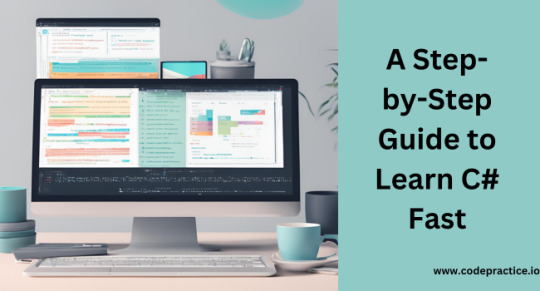
Learn C# programming step-by-step with this beginner-friendly tutorial. Understand syntax, variables, loops, and more with easy examples. Perfect for new coders looking to start their C# journey.
0 notes
Text
PHP $ and $$ Variables
Understanding PHP $ Sign
The PHP parser uses the dollar sign, a reserved symbol, to figure out what you've specified as a compile-time variable. Certain words and symbols have been set aside in PHP so that the parser may analyse the code script and identify code blocks by establishing explicit rules. These guidelines, or reserved names, are a means of preventing naming conflicts between your classes, variables, and fundamental PHP functions, among other things. PHP separates itself from the rest of the string (script) using the dollar sign in its syntax. Symbols (Sigil's) were employed to display variables and their scope, drawing influence from Perl, which PHP shared many characteristics with in its early days.

0 notes
Text
PHP Full-Stack Developer Certification Course
1. Introduction to Full-Stack Development
Understanding the full-stack ecosystem.
Role of PHP in modern web development.
Overview of front-end and back-end integration.
2. Frontend Development
HTML5 and CSS3: Building responsive and accessible web layouts.
JavaScript: Core concepts, DOM manipulation, and ES6 features.
Bootstrap: Designing responsive and mobile-first web pages.
React or Vue.js (Optional): Adding dynamic interactivity to your web apps.
3. Backend Development with PHP
PHP Basics: Syntax, variables, functions, and error handling.
Working with Databases: MySQL basics, CRUD operations, and PDO.
Advanced PHP Concepts: Object-Oriented Programming, sessions, and file handling.
Building APIs: RESTful APIs using PHP for dynamic data.
4. Full-Stack Integration
Combining front-end and back-end using PHP.
AJAX for seamless data exchange.
Creating and managing sessions for user authentication.
5. Database Design and Management
Normalization techniques for efficient databases.
SQL queries for complex data retrieval.
Using database management tools like phpMyAdmin.
6. Framework Mastery: Laravel
Setting up Laravel for rapid development.
Routing, controllers, and views.
Eloquent ORM for advanced database interactions.
Building scalable and secure applications.
7. Version Control with Git
Basics of Git and GitHub.
Managing code repositories and collaborating on projects.
8. Deployment and Hosting
Configuring web servers (Apache, Nginx).
Hosting on platforms like cPanel, AWS, or Heroku.
Managing domains and SSL certificates.
9. Capstone Project
Develop a complete full-stack application (e.g., an e-commerce site or blog platform).
Incorporate learned skills into a professional project.
10. Certification Exam
Online test to validate your knowledge.
Practical exam to demonstrate your development skills.
Who Should Enroll?
Aspiring full-stack developers.
Web designers aiming to enhance their back-end knowledge.
PHP developers seeking to expand their skill set.
Course Duration:
12–16 weeks (flexible learning pace).
Outcome:
Certification as a PHP Full-Stack Developer.
Portfolio of projects showcasing your skills.
Fullstack course in chennai
Fullstack developer course in chennai
Fullstack training in chennai
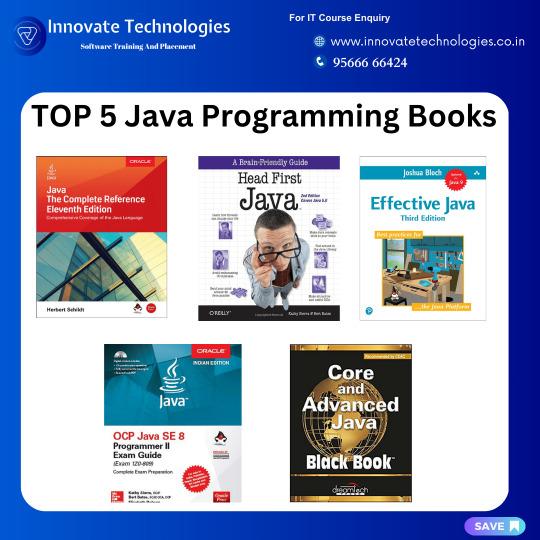
0 notes